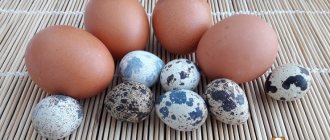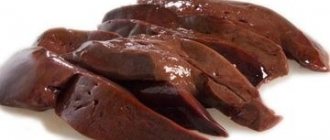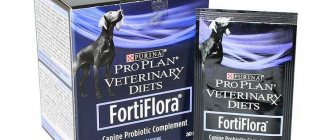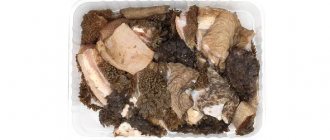Pet owners love their pets and strive to give them the best, but everyone has their own idea of what's best. Some people choose ready-made premium food, others carefully create a menu of natural fresh products, while others give their pet the same thing they eat themselves. In any case, the dogs end up with potatoes, but whether they can actually have them or not is an open question.
Dogs and potatoes are a burning question for many owners.
Features of digestion in dogs
Dogs digest food much faster than humans. The intestines are shorter, and food entering it is absorbed almost instantly. Dogs also lack enzymes involved in the breakdown of certain carbohydrates, in particular starch. And, as you know, potatoes are famous for their high content. Therefore, the vegetable is difficult for the animal to digest. But this does not mean that you need to completely abandon it in your diet.
The dog’s diet must be carefully considered so as not to harm its health.
Potential Harm
But eating potatoes too often can cause significant harm to the animal’s body. Large amounts of starch and slowly digestible carbohydrates lead to active formation of adipose tissue. With a lack of physical activity, this is fraught with the appearance of excess weight. In addition, consuming starchy foods increases the glycemic index. Another sad result of active consumption of potatoes is the development of diabetes in dogs.
If there is an enzyme deficiency, the animal may experience individual intolerance to the product, which will be expressed in indigestion, pain, spasms, and diarrhea.
Veterinarians have calculated the optimal amount of potatoes for a pet to eat. It is 100-150 g (this is one large or two medium tubers) per week for large individuals. For small breed animals, the amount of potatoes eaten per week should not exceed 50 g (one small tuber).
Potatoes in a dog's diet
The dog's diet should be balanced and varied. When he eats dog food, there is no need to worry, because the animal receives the necessary vitamins and minerals. When the dog has become accustomed to natural food, it is worth adding vegetables and fruits to his menu. In particular, the benefits of potatoes are difficult to overestimate.
Can dogs eat tomatoes, cucumbers, cabbage and other vegetables?
The main thing is not to exceed the recommended amount when feeding:
- For medium and large-sized dogs – 1-2 tubers per week, that’s 100-150 grams.
- Miniature pets require a smaller dose, no more than 50 grams in 7 days.
Is there any benefit
Potatoes are valued due to their composition. The vegetable contains:
- calcium, phosphorus and magnesium;
- vitamins C, E and B.
- iodine, which ensures the functioning of the thyroid gland and strengthens the immune system;
- potassium, which has a beneficial effect on the cardiovascular system.
Note! Potatoes normalize the functioning of the intestines and stomach when consumed correctly. The vegetable also relieves spasms and removes toxins from the body.
Harm to dogs
Potatoes have a negative effect when the dog eats them in unlimited quantities. It is unable to cope with the high starch content, which leads to intestinal and digestive disorders in general.
Fried potatoes are harmful to animals
About the benefits and harms of potatoes
Once upon a time in Europe they did not even know the taste of potatoes, although in South America, the birthplace of the root vegetable, they were idolized in ancient times. Peter the Great brought “earth apples” to Russia, ordering them to be grown everywhere. At first, potatoes appeared as a dish in the houses of aristocrats, and on the tables of peasants, turnips played their role. Only towards the end of the 19th century did the “potato revolution” take place, and potatoes finally won the hearts of both the most sophisticated gourmets and the common people.
We won’t talk about tastes; it’s better to remember the beneficial properties of the root vegetable. Potatoes contain:
- carbohydrates;
- vitamins;
- minerals;
- cellulose.
Potatoes can be called a medicinal plant because they have antioxidant and antispasmodic properties and have a beneficial effect on the gastrointestinal tract and cardiovascular system. It contains:
- starch. This is a source of carbohydrates that are converted into energy. On the one hand, this is useful, but on the other hand, it threatens obesity and diabetes, both for people and pets. In addition, starch is poorly absorbed by the body of pets and clogs the stomach and intestines, which leads to constipation, flatulence and indigestion. Do not forget that dogs have short intestines, so they become clogged quite quickly from starchy foods;
- fiber is a beneficial plant component for the body, which is often called the fourth nutrient along with proteins, fats and carbohydrates. It improves digestion and absorbs excess fluid in the body. Due to their beneficial properties, manufacturers include plant components (including potatoes) in premium and holistic food;
- microelements, including potassium and copper. The first promotes the smooth functioning of the heart and blood vessels, the nervous system, and is a building material for muscles. Potassium also ensures water balance in the body. Copper helps form bone tissue and collagen, a protein that forms the basis of connective tissue;
- vitamins A, groups B, C, E. Vitamin A ensures good vision, improves coat quality, group B vitamins are involved in almost all processes occurring in the body, ascorbic acid (vitamin C) helps strengthen the immune system and improve metabolism. Vitamin E strengthens the nervous system and muscles.
Considering the beneficial composition of potatoes, veterinarians do not categorically prohibit giving them to dogs; the only question is how much and in what form. And can all dogs have potatoes?
Experts are confident that there is no need to include potatoes in the diet of pets. If a dog eats a potato, it will not do any harm, but there are many other, healthier vegetable crops that will provide the pet’s body with the necessary vitamins and minerals.
What kind of potatoes are allowed?
For dogs, fried potatoes are a prohibited food. It should be abandoned in any case. Primarily due to vegetable oil, which releases toxins during heat treatment.
Raw potatoes
Can dogs really have melon: fact or fiction?
When choosing potatoes for your dog, you need to carefully examine the tubers. If there are green spots on them, then the vegetable contains corned beef. This is a toxic substance formed during storage. It is better not only for animals, but also for people not to eat such vegetables.
Raw potatoes without visible spots or rot can be given to dogs. The root vegetable with the peel is considered useful. But before offering it to the animal, it must be thoroughly washed. Sometimes dogs are given potato peelings to add to another dish.
Boiled potatoes or mashed potatoes
Whether you can give your dog boiled potatoes depends on how they are cooked. For example:
- Vegetables cooked in their skins are more beneficial. It retains maximum nutrients.
- Baked potatoes contain almost the same vitamins as raw potatoes. Its addition to the diet is welcome. In this case, you need to cool the dish.
- Mashed potatoes are mixed with porridge and other vegetables when feeding your pet. The dish is not as healthy as the tuber seen or boiled in its jacket, but some of the valuable substances are retained in it.
Boiled potatoes can be added to soup for dogs, along with carrots and cabbage. But it is worth remembering that spices are contraindicated for animals. Also, many veterinarians advise avoiding broth cooked with meat.
Important! Pork is a prohibited food for almost all dogs.
Spoiled food
Mold or spoiled foods, particularly potatoes, pose a danger to the animal. They can cause diarrhea and diarrhea. And such manifestations are fraught with dehydration, which can lead to dire consequences.
The dog should be given exclusively fresh, unspoiled product.
In what form should I give potatoes?
You need to know in what form this food can be given to your dog so that it receives all the beneficial substances contained in it, and the risk of health problems is minimized.
Raw tubers
The maximum amount of useful elements and vitamins is contained in the raw product.
Therefore, it is not recommended to use heat treatment of tubers for feeding dogs. Before giving potatoes to your pet, you need to wash them well, cut them and add them to the food. Veterinarians do not recommend using old potatoes to feed animals. It is necessary to ensure that the dog does not come across a green tuber, which contains the poison solanine, which is dangerous not only for pets, but also for people. The highest concentration of the substance is in the peel. If the poison enters the animal’s body, it will cause severe illness, which can lead to the death of the pet in the absence of prompt assistance.
Raw tubers contain the maximum amount of nutrients.
Solanine disrupts the functioning of the central nervous system, negatively affects hematopoiesis, and provokes indigestion. Since the poison is eliminated through the kidneys, the risk of pathology of the excretory system remains. As a last resort, greened tubers should be boiled before feeding the dog.
It is also not recommended to give sprouted or old potatoes to animals; they contain the highest concentration of a toxic substance.
Boiled potatoes
After heat treatment, the concentration of nutrients and vitamins in potatoes decreases sharply. This product is ballast for the dog’s body. If you regularly consume boiled potatoes, there is a risk of developing obesity. These potatoes can be given rarely and in small quantities. It’s better to stick with baked or boiled in its jacket. Such tubers retain more useful substances.
Fried
Fried potatoes are contraindicated for dogs. It not only contains a minimum of nutrients, but also a high concentration of cholesterol. Also, during the frying process, carcinogens are formed in potatoes - dangerous substances that provoke the development of cancer cells. This product contains a lot of fat, which negatively affects the liver and pancreas.
Fried potatoes are dangerous carcinogens.
How to train a dog to eat potatoes
Is it possible to salt food for dogs when cooking?
A slice of raw potato, without stains or signs of rot, can be placed next to the dog’s bowl. If the root vegetable interests him, he will try it. Another option is to add raw or cooked grated vegetables to your dog’s usual dish.
Note! Potatoes should be just an additional ingredient, like a seasoning, an additive rich in vitamins and minerals.
If the dog doesn’t like the new taste, don’t insist. It is better to offer him other vegetables and experimentally find out what he prefers.
First aid for poisoning
If poisoning with low-quality potatoes does occur, you should immediately provide first aid to the animal. This will mitigate the consequences and facilitate further treatment.
The main actions are:
- provoke vomiting (give the animal a weak solution of potassium permanganate);
- give an adsorbent drug (Smecta, Polysorb, Activated carbon, Enterosgel);
- take the animal to a veterinary facility as soon as possible.
If fed correctly, potatoes may well be an integral part of an animal's diet. Veterinary companies involved in the development of professional food recipes that we give to dogs introduce potatoes into their composition, but only after the starch has been removed from their pulp.
How to feed
Potatoes should accompany meals or act as a treat. But you should never use it as a main dish.
Is it possible to feed your dog potatoes every day?
- Offer twice a week, for a total of 2 tubers. This is enough for the dog to receive the necessary vitamins and nutrients.
- You cannot give more than half a potato at a time, less is possible.
- You don’t need to feed your dog a vegetable every day, otherwise digestive problems cannot be avoided, even if the pet reacts normally to the product.
Special dry animal feeds also contain potatoes, but their amount does not exceed 4 percent of the total volume. The main thing is that it is not one of the first five main ingredients. Then you can doubt the quality of the product. Dried potatoes or, as they are otherwise called, flakes, are also added to the feed.
Potato flakes
Note! From February until the new harvest is received, it is better to forget about the healthy root vegetable. This will avoid poisoning your pet with solanine.
Content
1. About the benefits and harms of potatoes 2. How many potatoes can a dog have 3. In what form should you give them 4. To whom are potatoes prohibited?
Potatoes are often called “second bread”. To be honest, this product is the most popular in almost every home. Therefore, even those owners who strictly monitor the diet of their pets have incidents - either the dog grabs a piece of boiled potato from the table, or the owner himself treats it with a spoonful of mashed potatoes, without asking himself the question - is it possible to give the dog potatoes?
When to give up potatoes
After the dog tries potatoes, you need to watch him for several days. If your health does not change, you can periodically add the root vegetable to your food.
Alarming symptoms that require discontinuation of products and a visit to the veterinarian include:
- diarrhea or constipation;
- lethargy, apathy;
- refusal to eat;
- discharge from the eyes and ears;
- impaired coordination;
- altered breathing;
- low temperature;
- redness of the skin and itching, causing the dog to scratch, which leads to the formation of sores and ulcers.
Your dog may have an intolerance or allergy to potatoes. As for intoxication, the first signs appear after 3-4 hours. There is no need to wait for other symptoms, but it is better to show the dog to a doctor and exclude the vegetable from the diet.
You should not give potatoes to puppies under 5 months.
Potatoes are also contraindicated:
- Puppies up to 5 months. Their body is not yet strong, and eating a vegetable can be a real blow to digestion.
- Pregnant and nursing dogs.
- Dogs with problems with the digestive tract. This explains why, for example, Huskies are strictly forbidden to eat potatoes. It, along with grapes, causes fermentation in the intestines, which causes a lot of inconvenience.
Potatoes are a healthy vegetable, rich in starch and fiber. In small doses, it will not harm your pet, and will even serve as a source of vitamins and nutrients, especially if it is baked or offered raw. Owners should know in which cases it is better to refuse to use a vegetable so as not to harm the pet.
Properties of potatoes for the animal body
Opinions about the benefits of potatoes are controversial. Some experts are sure that such a product cannot be included in an animal’s diet, because it's too poisonous. But since each dog’s body is individual, its reaction to food may vary.
What are the benefits of potatoes
When eating potatoes in limited quantities, there is no risk to your pet's health. 1 tuber contains 50% of the daily requirement of vitamin C, and the product can also compensate for the deficiency of certain useful elements (for example, calcium, potassium, iron, etc.). Potatoes are a valuable source of a substance called quercetin. This is a strong oxidant that has strong antitumor, bactericidal and anti-inflammatory effects.
Potatoes contain vitamin C, potassium and iron.
Fiber, which is part of potatoes, has a beneficial effect on digestion and absorbs excess water in the body. Vitamin A ensures visual acuity and improves the condition of the coat. Ascorbic acid contained in potatoes strengthens the immune system and normalizes metabolism.
Harm and contraindications
Introducing potatoes into your dog's daily diet can negatively affect his health.
An increased concentration of starch and slowly digestible carbohydrates lead to the rapid formation of adipose tissue. If your dog doesn't move much, there is a high risk of overweight problems. Regular consumption of starchy foods can cause an increase in the glycemic index. Another reason why dogs should not have potatoes is the risk of developing diabetes. If there is a lack of food enzymes, the pet may develop individual intolerance, which is accompanied by the following symptoms: diarrhea, pain, cramps.
Potatoes are strictly prohibited for some animals due to the high risk of digestive upset.
These include:
- Puppies. Young individuals (up to 5 months) react most acutely to the product, because their enzyme system is still at the stage of formation.
- Bitches during pregnancy and lactation. The animal's body is under increased stress, so food should consist only of easily digestible foods.
- Pets with a sensitive digestive system and chronic gastrointestinal pathologies.
- Animals suffering from allergies.
It is not recommended to give potatoes to puppies.
What vegetables can dogs eat?
Vegetables suitable for dogs
- Kale. Benefits: Key kale vitamins such as K, A and iron support bone health, proper vision and immune function, fetal development and energy metabolism. ...
- Spinach. Benefits: Spinach contains potassium, magnesium and vitamins B6, B9 and E.…
- Carrot. ...
- Green bean. ...
- Broccoli. ...
- Beet. ...
- Celery. ...
- Cucumber.
THIS IS INTERESTING: Frequently asked question: how to get rid of small dog syndrome?
Who shouldn't it be given to?
It is not recommended to allow puppies of any age , and the consumption of potatoes by puppies under one year of age is strictly prohibited. Despite all the substances that an adult often lacks and which this vegetable contains in excess, this plant is considered poisonous. As for puppies, their bodies are not yet strong and their digestive system is weak, so eating potatoes can greatly harm them.
Do not add potatoes to the diet of a pregnant or lactating dog . During this period, the animal spends too much energy and often even loses weight, so on the contrary, it is recommended to give it more meat products - approximately 90% of the total food. Adding even a small portion of potatoes to your pet's diet can cause significant harm.
It is necessary to limit access to potatoes for a dog with intestinal diseases . If your pet has digestive problems, then this vegetable is contraindicated for him.
If your dog is allergic to many plant products, then you need to give potatoes with caution and carefully monitor the reaction. If the dog becomes ill, then no more potatoes should be given.
Potatoes are poorly digestible in small dogs . This is explained by the fact that such dogs have a less developed immune system, and eating any harmful product can adversely affect their condition.
About other unwanted foods on the dog menu
Veterinarians advise carefully monitoring a dog’s diet, especially during the period of growing up, that is, up to a year. The presence of the following products in it is undesirable:
- Avocado.
The fruits contain a dangerous substance, persin, which causes vomiting and stomach upsets in dogs. - Grapes, raisins, currants.
They contain a little-studied toxin that can damage the kidneys. - Mushrooms.
They contain a lot of protein and are difficult for the stomach to digest. - Yeast baked goods.
Digestion of such products is accompanied by the release of gases, often causing pain and fermentation in the dog’s intestines. - Pork fat.
If you add it to your dog’s food, it will provoke the development of pancreatitis. The same applies to the fat that remains in the pan after frying. - Sugar substitute.
It is intended exclusively for people, and in a dog’s diet it reduces blood sugar levels, leading to vomiting, loss of strength, and weakness. If a dog is given it constantly, the result will be liver failure. - Food for cats.
It differs from dog meat in its increased protein and fat content. This is unacceptable for the dogs' health. - Bird and fish bones.
These are dangerous foods that can cause intestinal obstruction. Fish often gets stuck in the throat. Therefore, in order for the dog to have something to chew on, it is better to buy large bones of horned animals. - Rhubarb leaf.
They contain oxalates, which negatively affect the kidneys and the urinary system as a whole. - Milk.
It leads to diarrhea in many dogs, especially if you offer them high-fat homemade milk. - Raw meat.
This product can be dangerous because it contains helminths, their larvae, and bovine tapeworm. And even if it was frozen, this will not protect the dog from infection.
Even pets whose diet is prepared taking into account the wishes of the veterinarian sometimes get a tasty morsel from the owner’s table. This could be potatoes, which most dogs will happily eat. So is it possible to give potatoes to four-legged pets?
Why some dogs shouldn't be given potatoes
There is a categorical ban on potatoes for certain categories of dogs. These include:
- puppies up to one year old. Can puppies have potatoes? The young body of such dogs is not yet strong, and the digestive system is not able to cope with starch. Therefore, to avoid harm, this vegetable should not be given to individuals under one year of age in any form;
- dogs that are at the stage of bearing offspring or feeding newborns. During these periods, the animal uses a huge amount of energy, which leads to weight loss. To replenish these parameters, the number of meat products in the diet should be increased (up to 90% of the total weight of food). Even a small portion of root vegetables will lead to negative consequences during such periods;
- individuals with diseases of the gastrointestinal tract. Potato tubers are contraindicated for such animals, since they are poorly absorbed even by healthy intestines;
- animals with allergies to plant products. In such a situation, you should give the vegetable extremely carefully. If a negative reaction occurs in the form of deterioration in health, eliminate the product from the diet forever;
- small breeds. Small dogs are characterized by poor immunity, so even a small piece of a tuber can lead to serious health problems.











